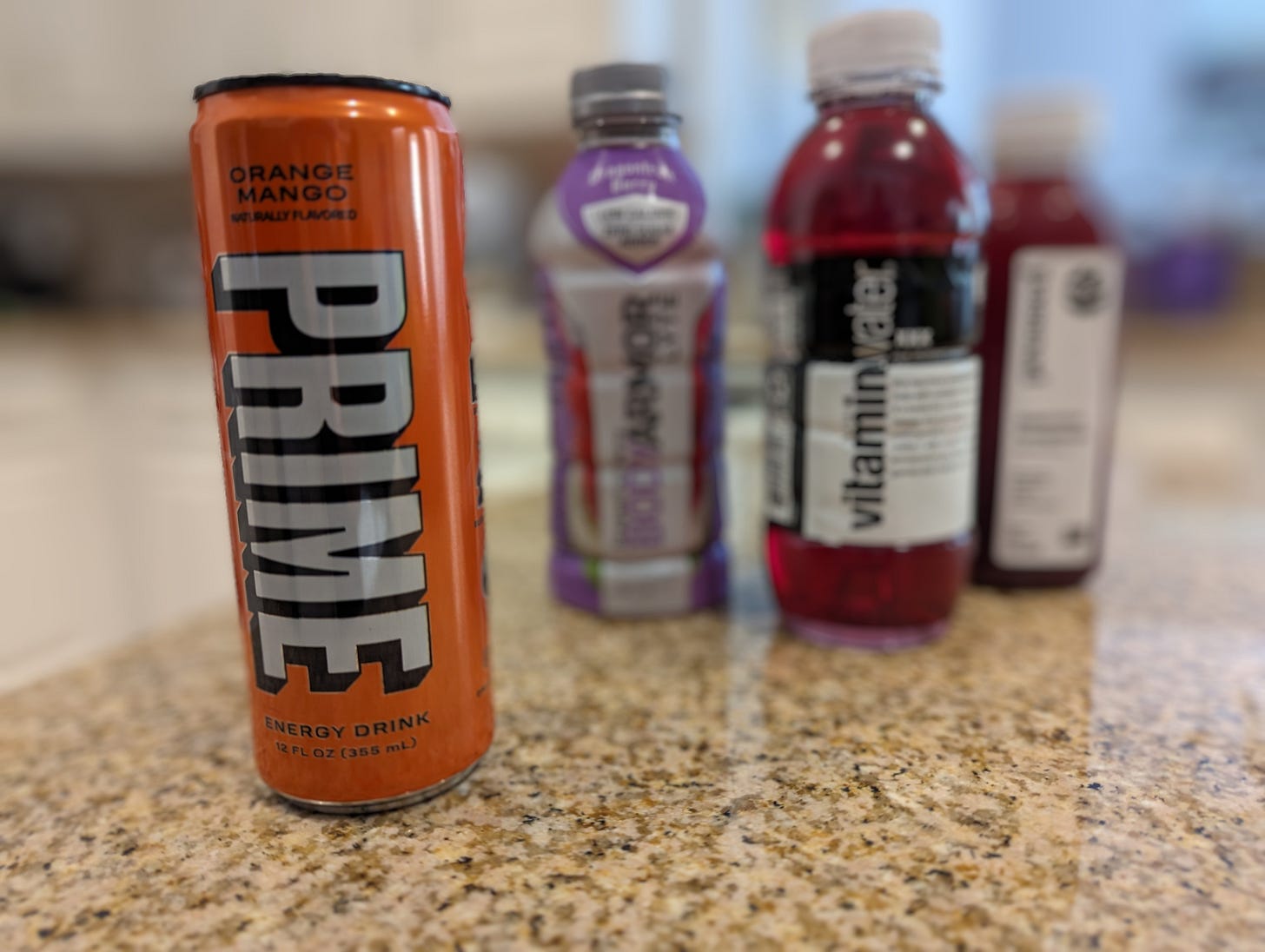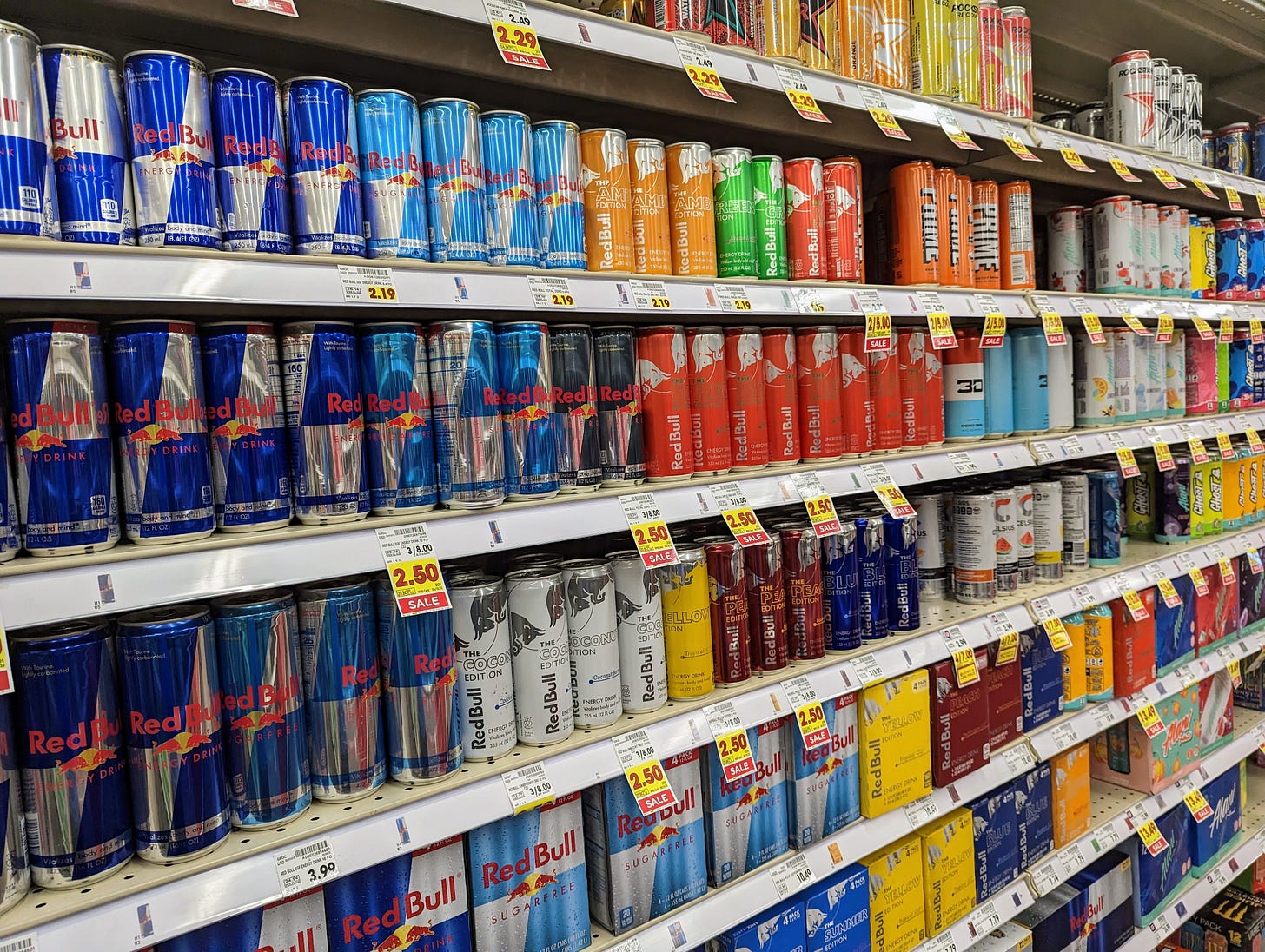Energy Drinks: They're Not Good for Your Kids, and They're Not Good for You.
Studies link popular energy drinks to a bevvy of negative health effects, including anxiety, and sleep and heart problems.
A few weeks ago, I headed off a caffeinated disaster in my household.
The kids had requested my wife purchase them PRIME, a popular hydration drink partially owned (and fully marketed by) by two YouTubers, Logan Paul and KSI. If you’re not familiar with PRIME, and you’re a parent of a child over the age of 10, I’d be shocked.
My wife grabbed a couple of cans of what she thought was the latest flavor of PRIME hydration. Before the kids got their hands on the drinks, I happened upon them in the kitchen and noticed that the can looked like slightly different from the PRIME bottles we’d previously purchased.
The “PRIME” logo was emblazoned on the side of the can, but below it, I saw two words in a smaller typeface: “energy drink.” As I examined the can, I noticed it boasted having 300 milligrams of electrolytes and 200 milligrams of caffeine (and being zero sugar and vegan, yay!).
Of course, the caffeine content alarmed me. For kids who rarely have any form of caffeine, the effects of a quick infusion of 200 milligrams could be uncomfortable. Imagining the kids suffering from racing heartbeats and a lack of sleep, I immediately poured the drinks out in the sink and threw away the evidence.
I hadn’t thought about this debacle much about in recent weeks, until I saw a New York Times article on PRIME Energy drinks. This excerpt from the story felt familiar:
In an email response to questions, representatives for Mr. Paul, the social media personality, and Prime Energy noted that the company’s cans labeled the drink as “not recommended for children under 18.” But parents and school officials are sometimes confusing the drink with Prime Hydration, a caffeine-free sports drink from the social media stars that is sold in bottles. That drink is also immensely popular, with more than $250 million in sales in its first year and customers waiting in line for hours to buy it at some grocery stores in Britain.
Looks like we weren’t the only parents who had confused PRIME hydration with PRIME energy. I wanted to share with you a comparison between the energy drink can and the hydration drink bottle, but similar to those customers in the U.K., this is what I found when searching for PRIME hydration on local store shelves (I gave up after my third store).
That said, I’m not just trying to pick on one brand, despite my personal experience and PRIME’s current cultural relevance among our YouTube youth. There’s numerous energy drinks on the market: old stalwarts like Red Bull, Monster, and Five Hour Energy, plus newer entrants like CELSIUS and Gatorade Fast Twitch. The Times article mentions several of these brands, and cites health concerns from school officials, a doctor and even a student, who worry about the negative health impacts of these drinks.
Research backs up these concerns. One study bluntly calls out the potential negative impacts of energy drinks for kids aged 12 - 19:
Consumption of [energy drinks] have been associated with multiple medical complications including anxiety, agitation, migraines, gastrointestinal upset, insomnia, arrhythmias, other cardiovascular complications, and in rare cases, even death. Recent literature has also found an increasing number of problems with behavior modification and cognitive capabilities in adolescents who use [energy drinks].
This study also noted “most cases of toxicity are attributed to caffeine, guarana and taurine,” which is important, because many of these energy drinks don’t just contain caffeine, but also features loads of other vitamins and “supplements” linked to energy. It doesn’t take a scientist to figure out combining all these energy-boosting substances in a drink could be bad for our kids. It’s flat out obvious.
Another study from Finland examined connections between energy drink use and “negative health indicators” in a large group of 13- to 15-year-olds. Researchers found kids who consumed energy drinks were more likely to report a variety of bad health behaviors, including smoking and tobacco use, marijuana use, problematic social media use, skipping breakfast, and even a lack of brushing teeth (dental health is serious business). In addition, kids consuming energy beverages reported sleep problems and and other health issues.
Consuming Energy Drinks Over 40
But what about us aging adults? Many of us drink coffee…what’s wrong with taking it up a notch?
A lot. Dr. Stephen Meldon, the director of emergency services at the Cleveland Clinic, outlined the risks of energy drinks for aging adults in a 2013 article from Next Avenue, a nonprofit journalism collective focused on issues for older adults:
Downing highly caffeinated energy drinks is like taking a heart stress test, Meldon says. Younger people can tolerate the effects, like insomnia and palpitations, better than older people can. If someone 50 or above came into his emergency room complaining of chest discomfort and palpitations, Meldon says he'd admit them for observation in case they were having a heart attack. “We need to be cautious in this age group,” he says, “because of underlying medical conditions.”
With heart health at the forefront for those of us over 40, I thought I’d check out some research on the links between energy drinks and heart health. Again, the results are not surprising. A study from Texas A&M University found some energy drinks caused “adverse effects on the muscle cells of the heart,” including “an increased beat rate and other factors affecting cardiac function.” Another study found energy drinks flat out raise your blood pressure, noting “those with hypertension should be more vigilant and limit their energy drink intake.”
And while there’s evidence out there that energy drinks do what they claim to do—increase your focus and yes, your energy—other studies show that they don’t do so better than a cup of coffee.
With the extreme amount of caffeine and added ingredients in energy drinks—vitamins, amino acids and herbal supplements—why take the risk? Based on the research, and my own hypertension, I’m sticking to my morning coffee (in moderation, of course).





Great article Alex. I don't think I have ever consumed an energy drink. But I was drinking good quality hydration drinks until I discovered a pinch of Himalayan sea salt in my water bottle can have just as good an effect.